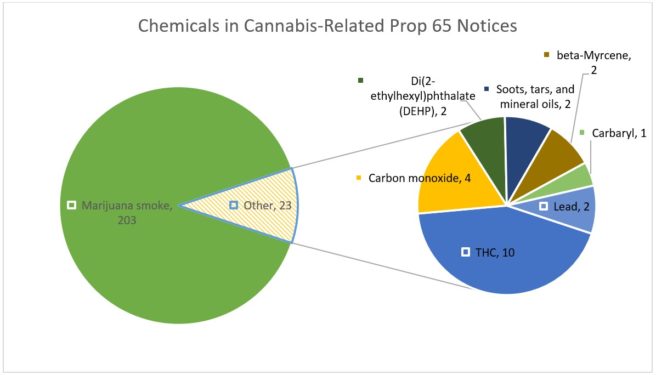As the cannabis industry and its associated sectors have gained increasing social and legal acceptance, these businesses have started to face an issue that has been plaguing traditional Consumer Packaged Goods companies in the state of California for decades—Proposition 65 claims.
Proposition 65 is a California initiative approved by voters in 1986 and enacted into law as the Safe Drinking Water and Toxic Enforcement Act. The law requires California to publish a list of substances that are known to the state of California to cause cancer or reproductive harm. The law prohibits “knowingly and intentionally” causing exposure to one of the substances on the list without first providing a “clear and reasonable” warning. To comply with Proposition 65, businesses must provide consumers with a Proposition 65 compliant warning unless they can ensure that their product does not expose consumers to a listed substance at levels that may cause cancer or reproductive harm.
There are currently over 950 substances on the Proposition 65 list. Most relevant to the cannabis industry, California has listed cannabis/marijuana smoke as both a carcinogen and a reproductive toxicant, and delta-9-Tetrahydrocannabinol (THC) as a reproductive toxicant.
Over the past ten years, Proposition 65 plaintiffs have turned their sights on the cannabis industry, issuing over 200 notices of violation for a variety of chemicals in products from smokable marijuana flower to CBD oil, and vape pens to hemp-based personal care products. While there were spikes in the number of notices issued in 2014 and 2017, there has otherwise been a slow increase in the claims relating to cannabis products since 2018.

While the majority of the notices target a few obvious Proposition 65 listed substances—e.g., marijuana smoke and THC—there are also notices alleging that cannabis products expose consumers to substances such as beta-Myrcene, lead, carbaryl, carbon monoxide, soot, tars, and mineral oils.

Takeaways
- As cannabis products become increasingly mainstream, companies will face an increasing number of claims from plaintiffs.
- Cannabis products may cause exposures to substances on the Proposition 65 list beyond obvious substances like cannabis smoke or THC.
- Companies should ensure that their compliance programs and policies address Proposition 65 issues.

















